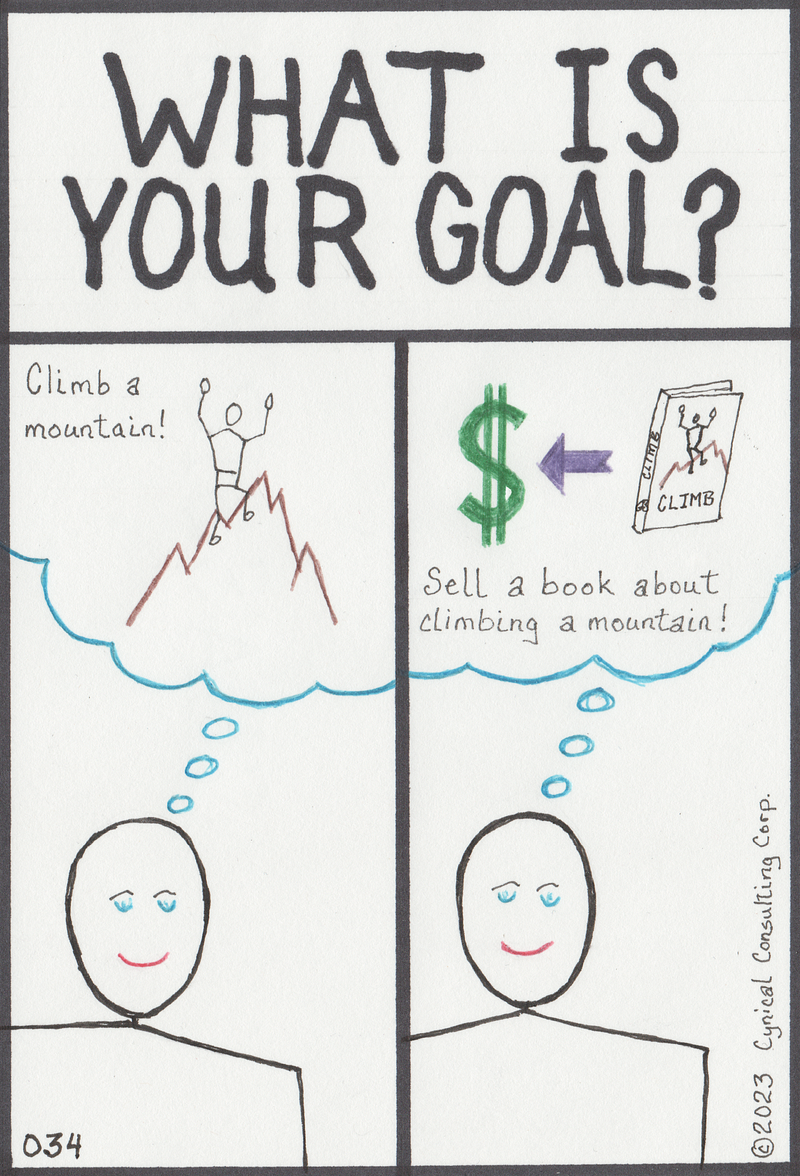How to Set Breakthrough Goals

A breakthrough goal is one that leap-frogs you waaaay ahead of everyone else.
Whether in a business or a personal context, a breakthrough goal moves you ahead further and faster than you thought possible.
To have a breakthrough goal, you need to identify the RIGHT goal! No methodology or process can help you achieve success if you pick the wrong goal.
To identify a breakthrough goal, you must break through the constraints in your thinking! Better thinking equals better results!!!
Background
I spent my consulting career working with others to solve problems.
I observed how people perceive problems and the steps taken to overcome them. I noticed that people differ in their ability to think beyond the obvious issue to the real root cause.
I was surprised by how few, even the professionals I worked with, saw the depth of the issue and who tried to put lipstick on a pig and enter it in the beauty contest.
The root cause is an undisciplined approach to analyzing and understanding problems.
I treat problems or challenges as projects to apply a methodology. The Cynical Project Management methodology guides the processes that identify, categorize, evaluate, and resolve problems.
The methodology provides a known, trusted, logical, and practical process that identifies all the questions to ask.
A methodology is like a fill-in-the-blank questionnaire; you follow the steps to gather the facts required to understand the problem, analyze the facts, evaluate the feasibility of options, develop a plan, and continuously improve.
Understanding the Goal
Identifying the goal is the first step of the Cynical Project Management process. Identifying a breakthrough goal only happens if you look beyond the obvious and see what is valuable to achieve.
Accomplishing this takes effort — most people aren’t interested in expending more effort than necessary. To identify the deeper goal means that you need to think.
If you’re not in the habit of thinking (thinking deeper about the things happening around you and to you), you can’t identify breakthrough goals.
Most people are lazy and, as a result, are lazy thinkers. They will let others think for them.
You see it all the time.
They are the lemmings that do what everyone else does. They see something on TV or social media and emulate that. They let other people tell them their opinion or what they should do.
They never take the time to think: “Is that what I want?”, “Is that something that will benefit me?”, or “Is there a better way than what others are doing?”
If you blindly do what everyone else is doing, then, by definition, you are the same as everyone else. Then everyone will cluster around the average.
If you are happy being average there is no need to read on. Keep doing what you’re doing…
How Not to Be Average
If you aspire to be better than average, I will tell you the secret: don’t be like everyone else!!!
Don’t think like everyone else; don’t act like everyone else.
It sounds simple, but it is difficult — you have to “deprogram” yourself.
It is impossible to do unless you consciously work on it. Western civilization has expended enormous expense to program you. You are likely unaware of the cultural, social, and economic influences on you.
You think that you are in control, but are you? Have you spent any time thinking about this question? If you answered “no,” you aren’t in control.
Are your actions your own, or just programmed responses to external triggers?
Are you a victim of advertising, peer pressure, or social media influence?
If you can’t think for yourself, I’m sorry to say: You are!!!
Learning to Think
You may be impressed with someone because they seem to have THE ANSWER!
If they have something you want and you want to replicate that for yourself, you assume that all you have to do is “buy” their answer.
You pay for it with money if it is a product or service.
You still pay something, even if no money changes hands. You pay when you accept an abstract or virtual product or service, such as an idea, point of view, manner of acting, or concept. The price you are paying is your ability to think for yourself.
For example, if you want to be rich, you may read books or seek advice from someone rich. It seems logical. If the expert was average and got rich, they can tell you how to do the same.
If it worked like that, we’d all be rich! Follow someone’s magic advice to be rich, too!
Is that the reality?
Hmmm…
So what is happening?
I’m not here to criticize experts or businesses who offer advice. They are trying to help others - just like me.
But their advice is only valuable if it fits your desires and who you are. (Same with my advice…)
You may know someone who has duplicated success and got rich by following an expert’s advice. I suggest that the REAL reason they were successful is that they had the circumstances, aptitude, and attitude enabling the advice to work. Their abilities contributed more to success than the advice.
99% of people who follow the same strategy, will not be successful because they don’t have the correct foundation to build on. It doesn’t matter if they were committed, worked hard, and followed the plan — they were missing the ingredients necessary for success. They didn’t realize they lacked specific factors that contribute to success.
The root cause of the lack of success is that they didn’t think it through. They didn’t analyze why it worked for the expert and if they had the same foundation and attributes to build on. They didn’t identify the barriers for them to duplicate the expert’s achievements.
If you want to be successful at anything (and everything), you HAVE TO THINK!!!
Thinking About Goals
I spend more time thinking about goals than most do. The reason is that I want to know that I am doing the right thing, the right way, for the right reasons.
I think about how to leverage the knowledge and experience of other individuals, while simultaneously assessing if their approach, solution, and advice will work for ME.
The Right Thing
Psychologically, our wants and our fears drive us. There are things we desire, and there are things we want to avoid.
If you let those base emotions drive your goal-setting, you will be setting/achieving shallow goals.
A “shallow goal” is the obvious thing you want — but doesn’t satisfy your wants or appease your fears.
The obvious example is “money.” In the modern world, you need money to survive. Many people focus on money as a goal, so they focus their time and energy on making money.
I used to be a Type-A person.
I focused on earning money as my primary goal.
This is normal behaviour, particularly when you are young and beginning a life on your own. It is the focus of the bottom two of Maslow’s Hierarchy of Needs.
As you ascend the Hierarchy of Needs in your life, you realize that money is a means, not an end. Money won’t make you happy. You may even know miserable rich people.
I look at money now as a measurement - not a goal.
The amount of money I have, or earn in a period, measures how successfully I reach my goals.
Money is the reward for success in many endeavours. Unfortunately, when you focus on money as the primary goal, you may achieve the goal but compromise other areas of your life.
A healthy goal requires you to think about more than your base emotions. You need to understand and control which of your desires or fears is driving you.
A method that I use to assess and identify worthy goals is asking the question: “Is this a goal or a measurement?”
For example, to me, money is a measurement. My goal is the freedom to pursue things that interest me. To reach that goal, I need a specific cash amount that allows me to never think about money again. I had a specific amount in mind (the measurement) that guided me to plan activities (earn, save, and invest) that allowed me to reach my freedom goal (retire and pursue personal interests).
If you have a goal, ask yourself: “Is this a measurement?” Then think deeply about the answer. If it is a measurement, what is it measuring? Follow that chain of reasoning until you understand what the “real” goal is.
When you understand decisive, higher-level goals, you identify and focus on what makes a significant difference in your life.
The Right Way
I don’t necessarily have the same knowledge, experience, aptitude, and attitude that the expert has, so I don’t start with an expectation that I can replicate their success.
I examine on what parameters their success depended. If I can match those parameters, then I know I can proceed. If not, then I have to either:
- determine if I can do something to satisfy the parameter dependencies, or,
- find a different expert, approach, or advice.
In addition, I am honest about the skills and attributes I possess.
I’d love to be a basketball superstar. But that isn’t achievable; no matter how hard I work, I won’t succeed (I’m too short and too old).
I don’t want to rain on anyone’s parade, but just because you passionately desire an outcome doesn’t mean you can achieve it. Dreaming is fine, but dreams only come true when action manifests it.
Another factor is ME. What I do, and how I do it, must fit with my core values.
For example, I could make a lot of money in sales by being dishonest or manipulative. But that doesn’t fit my values; I won’t do it.
The key takeaway is that you need to:
- Know Yourself — what are your skills, capabilities, values, desires, fears, and attitudes
- Be Honest with Yourself — recognize your strengths or weaknesses and how they contribute to or impede your success
For the Right Reasons
If you are pursuing a goal for the right reasons, you will stay motivated until you attain it.
Many success coaches propose that you should find your “higher purpose.”
When you understand and live in harmony with your higher purpose, you permit yourself to be true to yourself. You don’t copy what others are doing. You no longer feel compelled to do it the way others are.
Having the right reason will keep you motivated. It will be easier to push through the inevitable setbacks and challenges.
You will also be at peace with your progress until you ultimately reach your goal.
You will have found your path to reach your own goals.
Your Breakthrough Goal
To identify your breakthrough goal, consider the issues above and how you approach goal-setting.
If you are currently pursuing a goal, stop and consider:
- Why is this goal important to me?
- Is your goal a measurement? If so, what is the real goal this measurement exposes?
- Are you being honest about your capabilities to achieve the goal? Are you leveraging your strengths and compensating for your weaknesses?
I realize the examples above are high-level and don’t go deep into the thought process I use. I will write additional articles about how I used this methodology to reach other goals (such as losing 40 pounds or getting 100+ followers in less than a month). These articles will illustrate how I approach the goal-setting problem.
For now, I encourage you to think more.
The more you exercise the process of deep thinking, the better you will get at it.
If this is a new concept for you, I encourage you to:
- Think about this article. What do you agree with? What do you disagree with? What makes sense for you? What doesn’t make sense to you? How can you utilize and improve these skills to make your life better?
- Make your thinking concrete. Comment on this article. Don’t write platitudes - be specific! Think about why you agree/disagree. By communicating it in writing, you are forcing yourself to think.
- Keep practising! The more you examine and contemplate how you think about the things you take for granted, the better you will become at recognizing your programming and proactively taking control to change.
Keep thinking beyond the superficial; it will become a habit to benefit you.
Be Cynical,
GB
Summary
TL;DR: To have a breakthrough goal, you must identify the RIGHT goal!
Wisdom:
- A breakthrough goal only happens if you look beyond the obvious and see what is valuable to achieve.
- Breakthrough goals have three components: the right thing, the right way, for the right reasons.
- If you want to be successful at anything (and everything), you MUST THINK!!!
- Differentiate between a “goal” and a “measurement.”
- You must understand yourself to act in congruence with your values.
- You must have the personal capabilities to execute and reach your goal.
To extract the best value from this article, you should have read this first: Good News - Everything Is a Problem. If this is the first article of mine you have read, you should start at Read This First!.
The next article in this series is: 100 Followers: How I Identified a Breakthrough Goal.






Member discussion